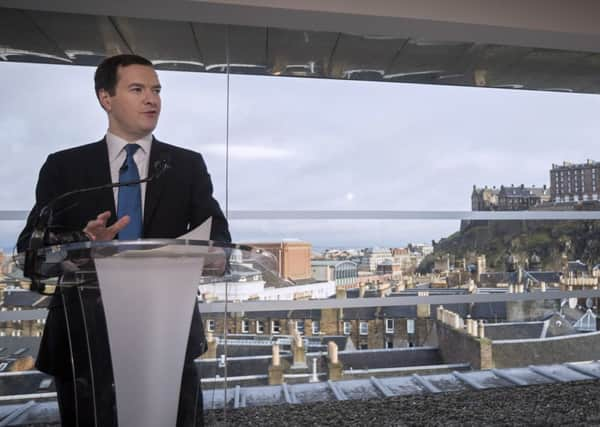John Curtice: Osborne effect weighs against No’s


Once the Don’t Knows are excluded, the poll points to a 43 per cent Yes vote, down three points. It would appear the UK government’s declaration it would not contemplate sharing the pound with an independent Scotland has pushed a crucial swathe of hitherto undecided voters into the No camp.
However, we should exercise caution. The 46 per cent Yes vote (once Don’t Knows are excluded) in our previous poll was unusually high. Indeed it is still the largest Yes vote recorded by any independent poll. Given all polls are subject to random variation we might not be surprised the Yes tally would fall back a bit this time. Our latest tally still puts the Yes side three points above where it was in September.
Advertisement
Hide AdAdvertisement
Hide AdMoreover, there is one substantial problem with the supposition that the currency announcement has persuaded a significant body of voters to vote No – it is not widely believed. Only 35 per cent of all voters, and only 34 per cent of those who would like to share the pound, believe an independent Scotland would not be able to do so.
One reason why the currency announcement may not have proved as credible as the No side might have hoped is because of the politics of its principal messenger, Chancellor George Osborne.
A clear majority of both Conservative and Liberal Democrat supporters believe the UK government would not be willing to enter a monetary agreement with an independent Scotland. But almost as many Labour supporters (39 per cent) believe an agreement would be reached as believe it would not happen (42 per cent). For many of them, perhaps, the announcement came from the wrong side of the political fence and was discounted. The No side may have to accept it is unwise to rely on coalition figures as spokespersons.
Meanwhile, the suggestion last weekend by the European Commission president, José Manuel Barroso, that an independent Scotland might be excluded from the EU seems to have even less credibility. Only 23 per cent of voters believe Scotland would either definitely or probably be barred from the EU. Moreover, those of that view consist disproportionately of the minority of Scots (29 per cent) who do not think Scotland should apply to join in the first place. Only 17 per cent of those who think Scotland should apply think application would be denied. But if recent interventions from the No side have seemingly proved relatively ineffective at getting through to voters, the Yes side seems to be having more success winning the arguments that do not matter as opposed to those that do.
ICM is regularly tracking both whether voters think independence would be good or bad for Scotland’s economy and whether it would result in more or less inequality. Claims that independence would result in less inequality have featured at least as strongly in the Yes campaign as have arguments that it would be beneficial for the economy.
Voters are more inclined to accept the Scottish Government’s claims about equality than not. As many as one in three thinks there would be less inequality while a little under one in five (19 per cent) feels there would be more. Moreover, the proportion who think there would be less inequality is up six points since September.
In contrast, voters are more likely to feel that independence would bad for Scotland’s economy (46 per cent) than believe it would be good (35 per cent).
It is the economic argument the Yes side needs to win. No less than 90 per cent of those who think independence would be good for Scotland’s economy say they will vote Yes, while no less than 91 per cent of those who think it would be bad indicate they will vote to stay in the Union.
Advertisement
Hide AdAdvertisement
Hide AdIn contrast, voters’ views of the possible impact of independence on inequality matter much less when it comes to deciding whether to vote Yes or No. Only 63 per cent of those who think independence would result in less inequality say they will vote Yes, while just three-quarters of those who reckon Scotland would be more unequal are No supporters.
The lesson for both sides is clear. Beware of focusing too much on issues close to your own hearts. They may not be the ones most likely to move voters. And it is after all, their hearts and minds you are trying to win over.
John Curtice is Professor of Politics at Strathclyde University